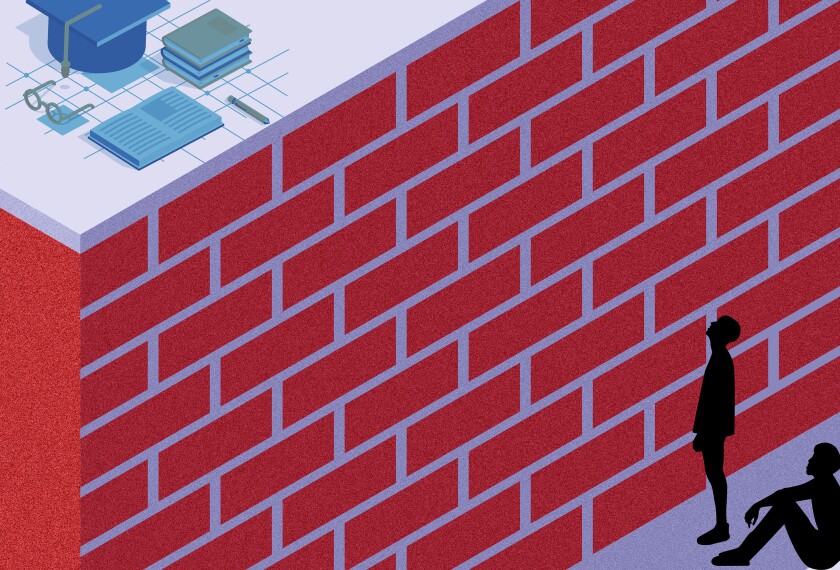A lack of student attentiveness and focus is causing disruption in public schools across the nation as the effects of the COVID-19 pandemic linger, new data says.
Twenty-six percent of public school leaders reported that “a lack of focus or inattention from students” had a “severe negative impact” on learning during the 2023-24 school year, according to new National Center for Education Statistics (NCES) data. This number spiked to 75 percent when school leaders were asked if students’ lack of focus or inattention had either a “moderate” or “severe” negative impact on learning.
When asked in the survey, “to what extent, if any, have the following student behaviors negatively impacted learning at your school this year?,” school leaders indicated that several of the listed student behaviors had a severe negative impact on learning.
Other than a lack of focus or inattention, school leaders selected the following as having a severe negative impact on learning:
- Students being academically unprepared for school (e.g., not doing homework, not bringing necessary supplies) (21 percent)
- Students being disruptive in the classroom (e.g., calling out, talking to others during instruction, getting out of a seat when not allowed, leaving the classroom) (19 percent)
- Students not doing individual work (19 percent)
- Students being physically unprepared for school (e.g., lack of sleep, not eating before school) (18 percent)
- Use of cellphones, computers, and other electronic devices when not permitted (16 percent)
NCES, a statistical and analytical center within the U.S. Department of Education’s Institute of Education Sciences, released the data on July 18 as part of the School Pulse Panel, a monthly data collection in response to the pandemic and its impact on public K-12 schools. These conclusions reflect data collected between May 14 and 28 from 1,714 public K-12 schools from every state and Washington, D.C.
The study reveals that as of May, 83 percent of public school leaders say that the pandemic and its lingering effects continue to negatively influence the socioemotional development of students. NCES said analyzing student focus data and the effectiveness of tutoring is key to addressing continued pandemic-induced learning setbacks.
“Schools continue to grapple with the ongoing impact the pandemic had on their students. Understanding the availability of tutoring, along with achievement data from the next 2024 National Assessment of Educational Progress release, will provide deeper insights into students’ progress toward learning recovery,” NCES Commissioner Peggy Carr said in a news release.
NAEP national assessments in reading and mathematics are conducted every two years in grades 4 and 8. The last NAEP results in math and reading were released in October 2022 and showed significant drops in student achievement.
NCES data reveals significant challenges in school climate, calls for increased support in public schools
Beyond student focus, this NCES data also polled public school leaders on aspects of school climate from the 2023-24 academic year. According to the data, 45 percent of public schools reported having confiscated a weapon from their students during the year, and 57 percent reported confiscating some type of substance.
The data also revealed the prevalence of cyberbullying, as 30 percent of public schools reported both instances of cyberbullying that happened at and outside of school, happening at least once a week among students.
Twenty percent of survey respondents also indicated that threats of physical attacks or fights between students occurred at least once a week during the 2023-24 school year, and 18 percent said bullying occurred at least once a week.
Additionally, 36 percent of public school leaders surveyed indicated that student acts of disrespect toward teachers or staff members, other than verbal abuse, occurred at least once a week, and 17 percent said the same of students’ verbal abuse of teachers or staff members.
Moving forward, school leaders have indicated that they need increased resources to better support student behavior. In May, 76 percent of the public school leaders polled said they needed “more support for student and/or staff mental health,” 71 percent needed “more training on supporting students’ socioemotional development,” 61 percent needed “more training on classroom management strategies,” and 52 percent said “more teachers and/or staff need to be hired.”
NCES also collected data from schools in the U.S. outlying areas—American Samoa, the Commonwealth of the Northern Mariana Islands, Guam, and the U.S. Virgin Islands. Twenty-eight percent of school leaders in this group reported that a lack of focus or inattention from students had a “severe negative impact” on learning during the 2023-24 school year.
The report also revealed data on tutoring practices within schools. Forty-six percent of public schools reported providing “high-dosage” tutoring during the 2023-24 school year, and 90 percent of these schools rated it as being at least moderately effective in improving student learning outcomes. High-dosage tutoring is defined by NCES as a student receiving one-on-one or small group tutoring three or more times per week, and for at least 30 minutes per session by an educator or trained tutor, among other qualifications.
Education Week has reached out to a representative of NCES for comment on how school districts should respond to this data.






